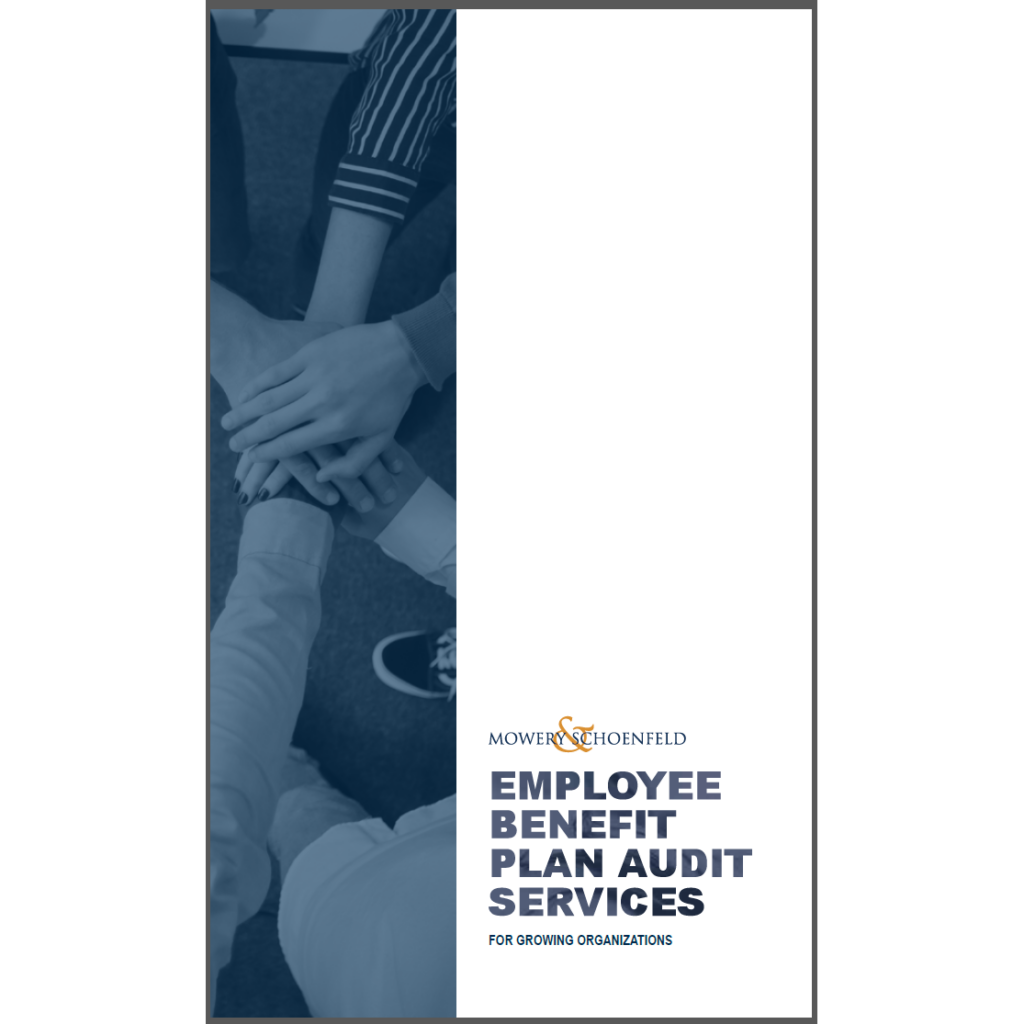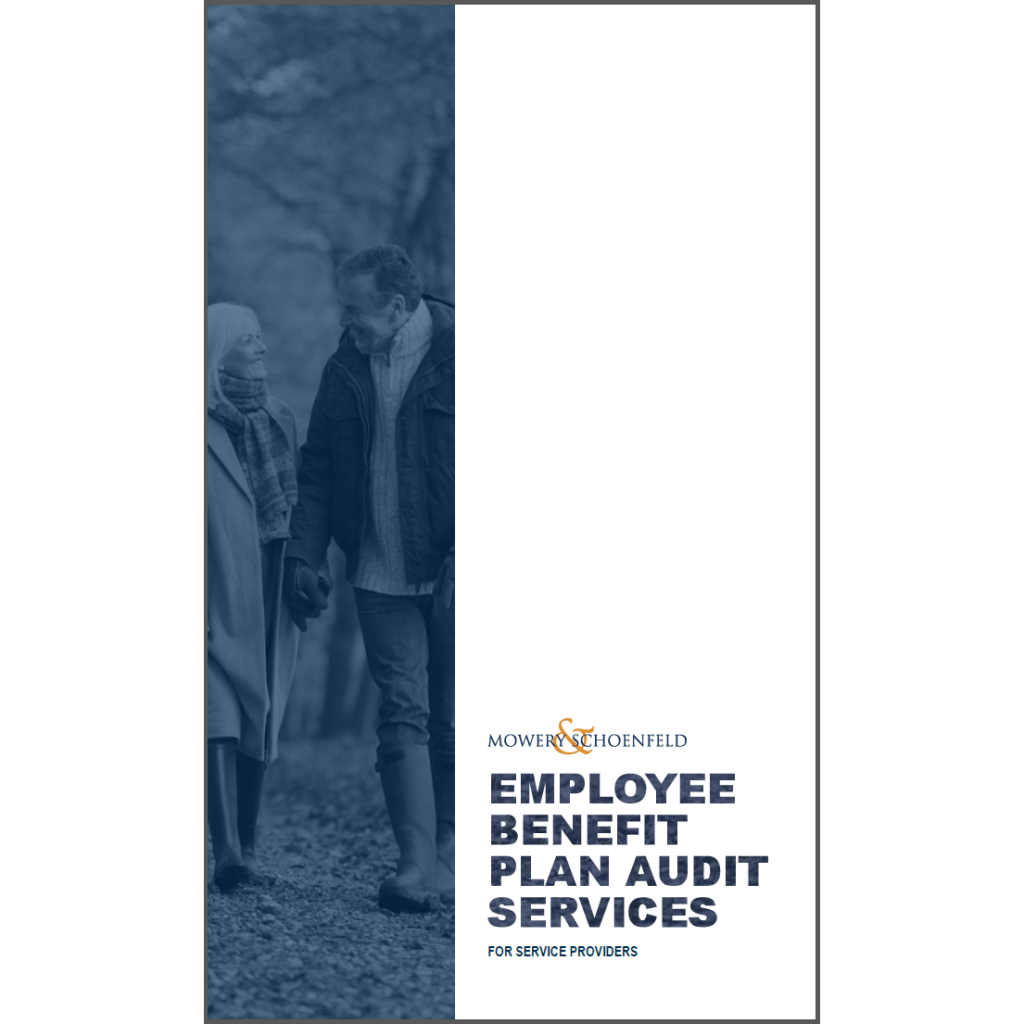If your company’s 401(k) plan has more than 100 account balances, the Department of Labor (DOL) requires an audit to ensure compliance with specific standards. Going through an audit can be a daunting process, especially if you’re going through the process for the first time. The team members at Mowery & Schoenfeld are experts in auditing standards and can get you through the required annual audit efficiently and on time.
401(k) Plan Audit Services

Employee Benefit Plan Audits
What Is a 401(k) Plan Audit?
Audits help protect the financial integrity of the 401(k) plan, ensuring the necessary funds will be available to pay the promised retirement benefits to participants and their beneficiaries.
During the audit, a team of certified public accountants with specialized training will review and test the plan administration, contributions and the timing of deposits, benefit payments, and participant loans, if applicable. We will then assist in completing the plan financial statements and provide recommendations related to improving the plan sponsor’s system of internal controls. Finally, we will provide feedback on the Form 5500, which will allow for timely filing with the regulatory agencies.

Selecting Your 401(k) Plan Auditor
The DOL encourages all employers to choose an audit partner wisely. A recent DOL study found that roughly half of all plan audits are conducted by firms that only perform one or two per year.
Selecting a qualified 401(k) plan auditor who has the expertise to perform an audit in accordance with professional auditing standards, is a critical responsibility in safeguarding your plan’s assets and ensuring your compliance with ERISA’s reporting and fiduciary requirements. Substandard audit work can be costly to plan administrators and sponsors. It both jeopardizes plan assets and can result in significant civil penalties being imposed on the plan administrator by the DOL.
The DOL urges administrators to consider the following factors:
1. The number and type of 401(k) plans the CPA audits each year
Mowery & Schoenfeld, LLC audits a significant number of 401(k) plans annually. We have a dedicated 401(k) Plan Audit Lead with a focus on sharing extensive knowledge and experience with our clients. Our services consist of both ERISA 103(a)(3)(C) and non-ERISA 103(a)(3)(C) (formerly known as limited scope and full scope) audits of defined contribution plans.
2. The status of the CPA’s license with the applicable state board of accountancy
Mowery & Schoenfeld’s partners and managers in the 401(k) Plan Audit Group are all licensed CPAs within the State of Illinois or Indiana.
3. Whether the CPA has been the subject of any prior DOL findings or referrals, or has been referred to a state board of accountancy or the AICPA for investigation
Mowery & Schoenfeld has not been the subject of any prior DOL findings or referrals and has not been referred to a state board of accountancy or the AICPA for investigation.
4. The extent of specific annual training the CPA received in auditing 401(k) plans
Mowery & Schoenfeld has more than 10 audit staff servicing the Employee Benefit Plan Audit practice. Each member is required to complete 40 hours of CPE (Continuing Professional Education) annually, with approximately 10 of those hours dedicated to plan audit quality and process. Additionally, certain members of our 401(k) Plan Audit Group also attend the AICPA’s and Illinois CPA Society’s employee benefits conferences annually.
5. Whether your CPA’s 401(k) plan audit work has recently been reviewed by another CPA, and whether such review had a positive result
Mowery & Schoenfeld is a member of the AICPA’s Employee Benefit Plan Audit Quality Center, which requires Peer Review procedures every 3 years. Firms can receive a rating of “pass,” “pass with deficiency(ies),” or “fail.” Mowery & Schoenfeld, LLC’s most recent Peer Review Report, dated January 17, 2024, received a rating of “pass.”
Our 401(k) Plan Audit Process

Our four-step approach to completing a 401(k) Plan Audit is designed to make the most efficient use of your time and resources. We are transparent and upfront about our timeline, costs, and expectations and will be available to answer questions or provide guidance throughout the process.
Step 1: Planning
- Gain an understanding of the plan and sponsor
- Complete documentation of internal controls
- Evaluate SOC 1 reports to determine key complementary user entity controls
Step 2: Audit Procedures
- Complete the testing of plan-level financial information
- Perform testing including eligibility and participant data testing, participant contribution and allocation testing, participant loan testing, distribution testing and compliance, and timeliness of contribution remittances to the plan
Step 3: Financial Statements and Management Letters
- Assist with preparation of the plan’s financial statements
- Provide recommendations and process improvements to management
Step 4: Review Form 5500
- Provide feedback on Form 5500 prepared by the plan’s third-party service providers and allow for timely filing with the regulatory agencies

